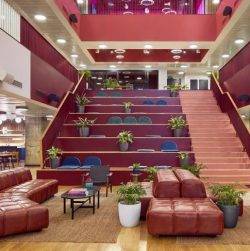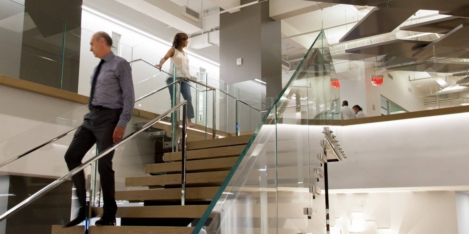June 21, 2018
The future of the workplace emerges from the mists at Neocon
 Chicago is one of the world’s great cities. Its dramatic lake and river setting, its magnificent architecture and its raw energy inspire the locals and businesses to achieve great things. People work and play very hard. Competition is fierce both in business as in the way the people relate to each other, and befits a city heavily influenced by waves of immigration down the ages. Apart from somewhat overly aggressive and noisy driving, if there is friction, you don’t sense it and it isn’t obvious. Most locals seem genuinely open and friendly, including to strangers, and happy to get on with their lives without troubling others. Perhaps they’re all being buoyed up by the great street music which is everywhere.
Chicago is one of the world’s great cities. Its dramatic lake and river setting, its magnificent architecture and its raw energy inspire the locals and businesses to achieve great things. People work and play very hard. Competition is fierce both in business as in the way the people relate to each other, and befits a city heavily influenced by waves of immigration down the ages. Apart from somewhat overly aggressive and noisy driving, if there is friction, you don’t sense it and it isn’t obvious. Most locals seem genuinely open and friendly, including to strangers, and happy to get on with their lives without troubling others. Perhaps they’re all being buoyed up by the great street music which is everywhere.



























 Organisations are failing to get the basics right when it comes to providing the digital and virtual systems that support employees in their roles, despite an evolving technological landscape and rise in flexible working, a new report has claimed. Data released by Leesman analyses how organisations can better support employees by offering the technology tools and infrastructure that enable people to work in a flexible way. In Deloitte’s 2018 Tech Trends report issued at the beginning of 2018, there was a heightened focus on how disruptive technologies will help businesses achieve larger strategic and operational goals and drive greater value. It predicted that within the next two years, more companies will embrace the emerging ‘no-collar workforce’ trend by redesigning jobs and reimagining how work gets done in a hybrid human-and-machine environment. However, Leesman’s findings show that, as of yet, organisations are failing to get the digital basics right. According to its latest dataset (Q1 2018) 23 percent do not agree that they have the technology tools and infrastructure that enable them to work in different locations across the office or from different locations outside of the office.
Organisations are failing to get the basics right when it comes to providing the digital and virtual systems that support employees in their roles, despite an evolving technological landscape and rise in flexible working, a new report has claimed. Data released by Leesman analyses how organisations can better support employees by offering the technology tools and infrastructure that enable people to work in a flexible way. In Deloitte’s 2018 Tech Trends report issued at the beginning of 2018, there was a heightened focus on how disruptive technologies will help businesses achieve larger strategic and operational goals and drive greater value. It predicted that within the next two years, more companies will embrace the emerging ‘no-collar workforce’ trend by redesigning jobs and reimagining how work gets done in a hybrid human-and-machine environment. However, Leesman’s findings show that, as of yet, organisations are failing to get the digital basics right. According to its latest dataset (Q1 2018) 23 percent do not agree that they have the technology tools and infrastructure that enable them to work in different locations across the office or from different locations outside of the office.








June 20, 2018
Successful EFMC event in Sofia sets its sights next on Dublin
by Beatriz Jiménez • Comment, Events, Facilities management
(more…)